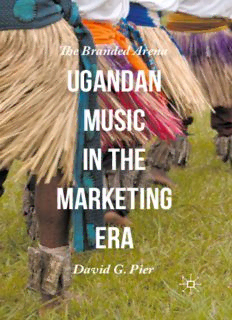
Ugandan Music in the Marketing Era: The Branded Arena PDF
Preview Ugandan Music in the Marketing Era: The Branded Arena
Th e Branded Arena UGANDAN MUSIC IN THE MARKETING ERA David G. Pier Ugandan Music in the Marketing Era Ugandan Music in the Marketing Era The Branded Arena David G. Pier UGANDAN MUSIC IN THE MARKETING ERA Copyright © David G. Pier 2015 Softcover reprint of the hardcover 1st edition 2015 978-1-137-54939-6 All rights reserved. No reproduction, copy or transmission of this publication may be made without written permission. No portion of this publication may be reproduced, copied or transmitted save with written permission. In accordance with the provisions of the Copyright, Designs and Patents Act 1988, or under the terms of any licence permitting limited copying issued by the Copyright Licensing Agency, Saffron House, 6-10 Kirby Street, London EC1N 8TS. Any person who does any unauthorized act in relation to this publication may be liable to criminal prosecution and civil claims for damages. First published 2015 by PALGRAVE MACMILLAN The author has asserted their right to be identifi ed as the author of this work in accordance with the Copyright, Designs and Patents Act 1988. Palgrave Macmillan in the UK is an imprint of Macmillan Publishers Limited, registered in England, company number 785998, of Houndmills, Basingstoke, Hampshire, RG21 6XS. Palgrave Macmillan in the US is a division of Nature America, Inc., One New York Plaza, Suite 4500, New York, NY 10004-1562. Palgrave Macmillan is the global academic imprint of the above companies and has companies and representatives throughout the world. ISBN: 978–1–349–57961–7 E-PDF ISBN: 978–1–137–54697–5 DOI: 10.1057/9781137546975 Distribution in the UK, Europe and the rest of the world is by Palgrave Macmillan®, a division of Macmillan Publishers Limited, registered in England, company number 785998, of Houndmills, Basingstoke, Hampshire RG21 6XS. Library of Congress Cataloging-in-Publication Data Pier, David G., 1975– Ugandan music in the marketing era : the branded arena / David G. Pier. pages cm Includes bibliographical references and index. 1. Performing arts festivals—Uganda. 2. Corporate sponsorship— Uganda. 3. Folk music—Uganda. 4. Beer—Uganda—Marketing. I. Title. PN1590.F47P54 2015 791.096761—dc23 2015017005 A catalogue record of the book is available from the British Library. Contents List of Illustrations vii Acknowledgments i x Notes on the Writing of Bantu Language Terms xi Introduction Dance Promotion in the Marketing Era 1 1 The Senator Extravaganza as a Marketing Project 29 Interlude Witnessing the Extravaganza 53 2 “Discover Our Land, Our Cultures”: The Musical Imagination of a Multiethnic Nation 6 3 3 Women’s Groups and Their Politics of Musical Promotion 85 4 The Music of a Senator Performance 1 15 5 Beyond the Senator Extravaganza: Marketing Ugandan Music to International Not-for-Profits 1 39 Conclusion The Branded Arena 171 Notes 1 77 Bibliography 1 83 Index 1 95 Illustrations Photos 1.1 Traditional beer gift at a brideprice ceremony 33 1.2 A traditional healer character in a drama by the group Birungi By’ensi 37 1.3 Mr. Senator stilt dancer 5 6 1.4 Harpist performing a “solo item” on his adungu, Lira 57 1.5 Acholi traditional folk dance, Lira 5 9 3.1 Mon Pi Dong Lobo 91 4.1 Tugezeku member, playing enkwanzi 122 5.1 Boys in Busembatya, playing papaya stem “trumpets” 150 Figures 4.1 Refrains of the five songs of “Omwenge Senator Mulungi” 129 4.2 Tamenhaibuga drum patterns 1 30 4.3 Xylophone entry, compared to the sung refrain 1 33 4.4 Xylophone pattern, comprising interlocked starter and mixer parts (mixer parts have small noteheads) 1 33 4.5 Enkwanzi panpipe interlocking 1 34 Tables 2.1 Senator Extravaganza 2006 Luganda-language advertisement, shown on television 6 4 4.1 Translated lyrics of “Omwenge Senator Mulungi” 1 27 Acknowledgments In the process of researching and writing this book about network- ing through music, I have come to rely greatly on my own growing social network. I wish to thank, first of all, the Ugandans who not only shared their knowledge and opinions with me, but also showed me extraordinary hospitality, inviting me into their homes, intro- ducing me to their friends, driving me long distances, and generally going out of their way to make sure my stay in their country was comfortable, productive, and enlightening: Haruna Walusimbi, Victoria Tibafaanana, Hajat Rehema Watongola, Mubialiwo Malyamu, Derrick Charch, Robert Mawanda, Patrick Kabanda, Watmon Amone, Andrew Kimuli, Claire Ssemambo, Kate Kimuli, Deborah Kyobula, Sarah Nangobi, Hilda Lakot, Mukiruka Syme, and Phillip Okullu. I must extend special thanks to my mukulu , James Isabirye, who dedicated the better part of a year to assisting me in every respect (and has the scars to show for it). This research was made possible by a Fulbright IIE grant. I thank Dorothy Ngalombi and Paul Stevenson, of the US Embassy in Kampala, for their facilitation of this grant. I received addi- tional research funding from Santa Clara University and from the University of North Carolina (UNC), Chapel Hill. My interest in Ugandan music arose out of my graduate work in ethnomusicology at the Graduate Center of the City University of New York (CUNY). Stephen Blum, my PhD adviser, has been an extraordinary mentor and friend, whose teaching continues to stimulate my thinking on music and culture. He was kind enough to read and comment on early drafts of this book. I also received invaluable guidance and intellectual grounding from my other CUNY professors: Peter Manuel and Jane Sugarman, who served on my dissertation committee, as well as Ellie Hisama. My growth as a scholar in graduate school was shaped by not only my teachers, but also my peers, in particular Stephanie Jensen-Moulton, Evan Rapport, and Alessandra Ciucci.
Description: